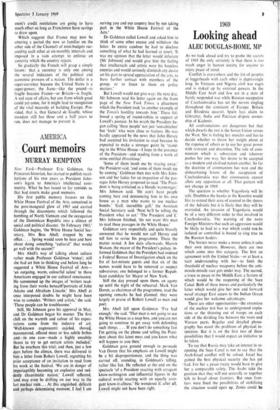Court memoirs
AMERICA MURRAY KEMPTON
New York—Professor Eric Goldman, the Princeton historian, has started to publish recol- lections of his two years as President John- son's legate to America's intellectual com- munity. What he has issued so far reminds us that bad courts make good memoirs.
His first public memory focuses on the White House Festival of the Arts, conceived in the post-inaugural glow of 1965 and carried through the discontents which followed the bombing of North Vietnam and the occupation of the Dominican Republic into a climax of social and political disaster. 'In February 1965,' Goldman begins, 'the White House Social Sec- retary, Mrs Bess Abell, stopped by my office.'... Spring would soon be here and how about doing something "cultural" that would go well with the season?'
Mrs Abell's way of talking about culture rather made Professor Goldman 'wince'; still she had set him to thinking and before long he suggested a White House Festival of Arts— 'an outgoing, warm, colourful salute' to those Americans engaged in our cultural renaissance.
He summoned up the images of 'writers read- ing from their works beneateportraits of John Adams and Abraham Lincoln.' Mrs Abell at once interposed doubts he might have been wise to consider. 'Writers and artists,' she said. `These people can be troublesome.'
Still, Mr Johnson gave his approval in May, and Dr Goldman began his muster. The first chill on the warmth and colour of his expec- tations came from the industry of `Well-known cognoscenti cajoled, shov , manoeuvred, offered more or less subtle bribes
and—in one case—made a highly unsubtle threat to try to get certain artists included.' But he overbore this trial; and then, just a few days before the climax, there was delivered to him a letter from Robert Lowell, regretting his prior acceptance of an invitation to read from his work at the festival. 'We are in danger of imperceptibly becoming an explosive and sud- denly chauvinistic nation,' Lo_ well reflected, and may even be drifting on our way to the last nuclear ruin. . . At this anguished, delicate and perhaps determining moment, I feel I am
serving you and our country best by not taking part in the White House Festival of the Arts.'
Dr Goldman called Lowell and asked him to think of some other excuse and withdraw the letter. In entire candour he had to disclose something of what he had learned at court. 'It was my opinion that the letter would infuriate [Mr Johnson] and would give him the feeling that intellectuals and artists were his hopeless enemies and would seriously diminish any desire on his part to spread appreciation of the arts, to have further contact with members of the group, or to listen to them on policy matters.'
But Lowell would not give way; the next day, Me-Johnson read his letter again on the front page of the New York Times. a placement which the President took 'as another example of the Times's hostility towards him.' There fol- lowed a spring of round-robins in support of Lowell's posture. In his wrath the President be- gan calling 'these people' not just `sonsabitches' but 'fools' who were close to traitors. He was hardly appeased by the news that John Hersey had accepted his invitation to read because he expected to make a stronger point by 'stand- ing in the White House—I hope in the presence of the President—and reading from a work of mine entitled Hiroshima.'
'Some of them insult me by staying away,' the President said, 'and some of them insult me by coming.' Goldman then met with Mrs John- son and her ladies for an inspection of the pas- sages John Hersey proposed to read. 'The Presi- dent is being criticised as a bloody warmonger,' Mrs Johnson said. 'He can't have people coming here and denouncing him in his own house as a man who wants to use nuclear bombs."Gall, incredible gall,' the Assistant Social Secretary said. 'Next he'll be telling the President what to eat.' The President and I,' Mrs Johnson finished, 'do not want this man to read these passages in the White House.'
Goldman very respectfully and quite bravely answered that he would not call Hersey and tell him to revise his programme. There the matter rested. A few dais afterwards, Marvin Watson, the mayor of the President's palace, in- formed Goldman that the President had ordered a Federal Bureau of Investigation check on the list of last-minute guests and that six of the names would have to be removed as suspect subversives; one belonged to a former Repub- lican candidate for Mayor of New York.
Still the day pressed upon them, an agony up until the night of the rehearsal. Mark Van Doren, as chairman of the programme, read the opening remarks he had planned; they were largely in praise of Robert Lowell as man and poet.
Mrs Abell fell upon Goldman. 'I've had enough,' she said. 'That man is not going to use the White House as a soap box, and youare not going to continue to get away with defending such things. . . . If you don't do something fast I'm getting on the phone and telling the Presi- dent about this latest mess and you know what • will happen to you then.'
Goldman gave ground enough to persuade Van Doren that his emphasis on Lowell might be a bit disproportionate, and the thing was carried off, sounding, in Goldman's telling, rather like fun. He reflected at the end on the spectacle 'of a President reacting with arrogant ktiow-nothingism and influential figures in the cultural world reacting with an equally arro- gant know-it-allness.' He wondered if, after all, Lowell might not have been right.


































 Previous page
Previous page